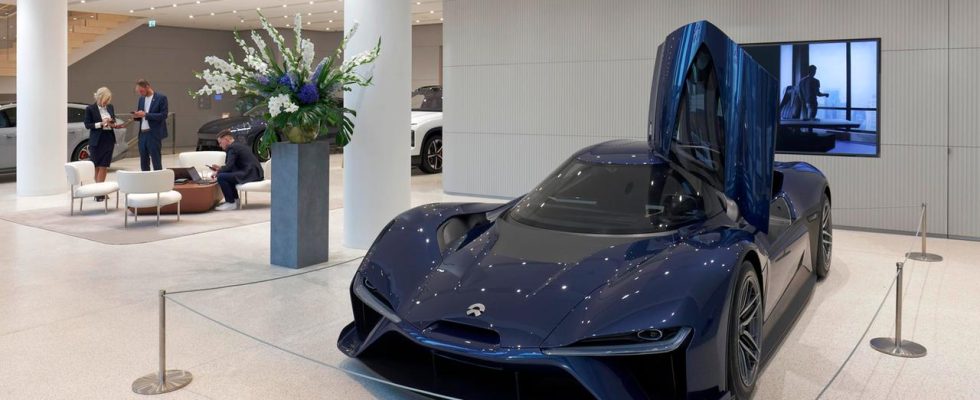background
Elaborate showrooms from mostly Asian electric car manufacturers are spreading across German city centers. Brands like NIO, Polestar, Genesis and BYD are moving into the best locations.
Stephane Burger’s eyes shine when he presents the 1,600 square meter showroom. The regional manager of the Chinese electric car manufacturer NIO is proud of the branch in downtown Frankfurt. “We’re still at the beginning, we only opened the house at the end of March last year.”
NIO is pursuing a completely new sales concept. There are more than just cars in the showroom. Anyone can walk in here and sip a coffee, work for free in co-working spaces, hold meetings and drop off their children in a kind of Chinese Smaland. The goal is to build a community of customers who will sooner or later buy a NIO and remain loyal to the brand for life.
Attention is everything
Directly next door are other electric car producers such as Polestar, a merger of Volvo and the Chinese manufacturer Geely, and Genesis, an offshoot of the Korean brand Hyundai.
BYD is also currently in the process of setting up showrooms in various German cities. The Chinese manufacturer’s sales rooms may be smaller, but they pursue the same goal as NIO: attention at any price. And the price is high.
Experts suspect that millions were invested in downtown Frankfurt in order to gain a foothold in the highly competitive car market. “They know they need staying power, but if you don’t invest now, you will never be able to potentially be the next Tesla,” says marketing expert Christian Schulze from the Frankfurt School of Finance and Management.
At Polestar they don’t try to build a large community like at NIO. “We see that we still need a lot of explanation,” says Head of Sales Frank Mäling. “Last year, only one in five cars registered in Germany was purely electric. For us, that also means: four out of five still need a lot of advice, and we want to show them why electromobility is not a sacrifice.” Polestar wants to stay in downtown Frankfurt until this mission is accomplished.
German manufacturers: none
You won’t find showrooms from German manufacturers in city centers. But you no longer have to fight for popularity. Every child knows brands like VW, Mercedes or Opel. They pursue the concept of branches and car dealerships on the outskirts of cities.
One of these car dealership owners is Arturo Rinaldi in the Alt-Rödelheim district of Frankfurt. He observes developments with a certain respect. “China is more willing to take risks, China is more efficient,” he says. He would like German politics to not only focus on e-mobility, “so that we don’t completely abandon the combustion engine as a mainstay.”
But it looks like the fear of the Chinese dragon is a bit premature. NIO announces that it has successfully placed five car models on the German market. However, the number of new registrations last year was rather modest, and even competitors were ahead.
A research by Hessian radio has revealed that the Swedish-Chinese manufacturer Polestar has registered 6,288 new cars in 2024 so far, BYD 4,139 and NIO actually only 1,263. In comparison, German manufacturers still sell a lot more: VW has registered over 70,000 new electric cars, Mercedes over 36,000 and Opel has 27,765.
Data protection and bureaucracy as a disadvantage?
Arturo Rinaldi does not believe that German manufacturers will have anything to counter Asian electric car manufacturers in the long term. Because Chinese manufacturers like NIO or BYD have a big advantage – big data. “It’s not just about moving the vehicle from A to B. It’s also about first collecting the data associated with it, having it available and integrating it as a development framework and building block in the new automotive world.” Data protection and excessive bureaucracy in this country prevented German manufacturers from catching up.
Back to the NIO showroom. The Chinese electric car manufacturer is making the biggest effort in downtown Frankfurt. There is an assurance from China that the showroom will continue to operate for several years, even if sales figures are still poor at the moment, says NIO regional manager Stephane Burger. “It’s nice to see the development of customers and interested parties who come in here and don’t even know what’s happening here and who we are, into really targeted visitors who are now coming here because of us and our vehicles.”
The showrooms of the new Chinese electric car manufacturers will – in all likelihood – continue to exist in city centers for a long time. Until they have either conquered the market – or have to give up in frustration. The advantage for potential customers: They can wait in peace and quiet with a cup of coffee in the elaborate rooms to see what happens.

